- Home
- Jack Kerouac
The Poetry of Jack Kerouac Page 4
The Poetry of Jack Kerouac Read online
Page 4
Or tears.
1961
from SAN FRANCISCO BLUES
13
This pretty white city
On the other side of the country
Will no longer be
Available to me
I saw heaven move
Said ‘This is the end’
Because I was tired
of all that portend
And any time you need
me
Call
I’ll be at the other
end
Waiting
at the final wall
14
San Francisco Blues
Written in a rocking chair
In the Cameo Hotel
San Francisco Skid row
Nineteen Fifty Four
1957
BLUES
And he sits embrowned
in a brown chest
Before the palish priests
And he points delicately
at the sky
With palm and forefinger
And’s got a halo
of gate black
And’s got a hawknosed
watcher who loves to hate
But has learned to meditate
It do no good to hate
So watches, roseate laurel
on head
In back of Prince Avalokitesvar
Who moos with snow hand
And laces with pearls
the sea’s majesty
1959
BLUES
Part of the morning stars
The moon and the mail
The ravenous X, the raving ache,
—the moon Sittle La
Pottle, teh, teh, teh,—
The poets in owlish old rooms
who write bent over words
know that words were invented
because nothing was nothing
In use of words, use words,
the X and the blank
And the Emperor’s white page
And the last of the Bulls
Before spring operates
Are all lotsa nothin
which we got anyway
So we’ll deal in the night
in the market of words
1959
Hey listen you poetry audiences
If you dont shut up
And listen to the potry,
See . . we’ll set a guy at the gate
To bar all potry haters
Foreverrnore
Then, if you dont like the subject
Of the poem that the poit
Is readin, geen, why dont
You try Marlon Brando
Who’ll open your eyes
With his cry
James Dean is dead?—
Aint we all?
Who aint dead—
John Barrymore is dead
Naw San Francisco is dead
—San Francisco is bleat
With the fog
1956?
SOME WESTERN HAIKUS
Explanatory Note By Author: The “Haiku” was invented and developed over hundreds of years in Japan to be a complete poem in seventeen syllables and to pack in a whole vision of life in three short lines. A “Western Haiku” need not concern itself with the seventeen syllables since Western languages cannot adapt themselves to the fluid syllabillic Japanese. I propose that the “Western Haiku” simply say a lot in three short lines in any Western language.
Above all, a Haiku must be very simple and free of all poetic trickery and make a little picture and yet be as airy and graceful as a Vivaldi Pastorella. Here is a great Japanese Haiku that is simpler and prettier than any Haiku I could ever write in any language:—
A day of quiet gladness,—
Mount Fuji is veiled
In misty rain.
(Basho) (1644-1694)
Here is another:
Nesetsukeshi ko no
Sentaku ya natsu
No tsuki
She has put the child to sleep,
And now washes the clothes;
The summer moon.
(Issa) (1763-1827)
And another, by Buson (1715-1783):
The nightingale is singing,
Its small mouth
Open.
SOME WESTERN HAIKUS
Jack Kerouac
* * *
Arms folded
to the moon,
Among the cows.
Birds singing
in the dark
—Rainy dawn.
Elephants munching
on grass—loving
Heads side by side.
Missing a kick
at the icebox door
It closed anyway.
Perfect moonlit night
marred
By family squabbles.
This July evening,
a large frog
On my door sill.
Catfish fighting for his life,
and winning,
Splashing us all.
Evening coming—
the office girl
Unloosing her scarf.
The low yellow
moon above the
Quiet lamplit house
Shall I say no?
—fly rubbing
its back legs
Unencouraging sign
—the fish store
Is closed.
Nodding against
the wall, the flowers
Sneeze
Straining at the padlock,
the garage doors
At noon
The taste
of rain
—Why kneel?
The moon,
the falling star
—Look elsewhere
The rain has filled
the birdbath
Again, almost
And the quiet cat
sitting by the post
Perceives the moon
Useless, useless,
the heavy rain
Driving into the sea.
Juju beads on the
Zen Manual:
My knees are cold.
Those birds sitting
out there on the fence—
They’re all going to die.
The bottoms of my shoes
are wet
from walking in the rain
In my medicine cabinet,
the winter fly
has died of old age.
November—how nasal
the drunken
Conductor’s call
The moon had
a cat’s mustache
For a second
A big fat flake
of snow
Falling all alone
The summer chair
rocking by itself
In the blizzard
—from BOOK OF HAIKU
SOURCES
A Translation From The French (Jester of Columbia, 1945)
Song: Fie My fum (Neurotica 1950)
Pull My Daisy (Evergreen Books 1961)
Pull My Daisy (Metronome April 1961)
He is your friend (Letter to Ginsberg 1952)
Old buddy (Ginsberg 1956?)
Daydreams for Ginsberg (Letter to Ginsberg 1955)
Lucien Midnight (Combustion April 1957)
Someday you’ll be lying (Kriya Broadside 1968)
I clearly saw (New Departures 1960)
Hymn (Pax 1959)
Poem: I demand (Pax 1962)
The Thrashing Doves (White Dove Review 1959)
The Buddhist Saints (Letter to Ginsberg 1956)
How to Meditate (Floating Bear 1967)
A Pun for Al Gelpi (Lowell House Printers 1966)
Sept. 16, 1961 (The Outsider 1962)
Rimbaud (Yugen 1960; City Lights)
from Old Angel Midnight (Beetitood 1959)
More Old Angel Midnight (New Directions 1961)
Auro Boralis Shomoheen (Letter to Ginsb
erg 1955?)
Long Dead’s Longevity (Letter to Ginsberg 1952?)
Sitting Under Tree#2 (Yugen 1959)
A Curse At The Devil (Red Clay Reader 1965)
Sight is just dust (Letter to Ginsberg 1955)
POEM (Letter to Ginsberg 1955?)
To Edward Dahlberg (TriQuarterly 1970)
Two Poems (Combustion 1957)
To Allen Ginsberg (White Dove Review 1959)
Poem: Jazz Killed Itself (White Dove Review 1959)
To Harpo Marx (Playboy 1959)
Hitch Hiker (Floating Bear 1967)
4 Poems from S. F. Blues (New Directions 1961)
from S. F. Blues (Ark 1957)
Blues: And he sits embrowned (Yugen 1959)
Blues: Part of the morning stars (Yugen 1959)
Hey listen you poetry audiences (Letter to Ginsberg 1956)
Some Western Haikus (Ginsberg, Yugen, Beetitude, Bussei, Portents (1956-1968)
Dates following the poems indicate year of publication, not necessarily composition. Dates followed by a question mark are approximate year of composition.
The Scripture of the Golden Eternity
Jack Kerouac died suddenly in 1969
at the age of 47.
1
Did I create that sky? Yes, for, if it was
anything other than a conception in my mind
I wouldnt have said “Sky”—That is why I am the
golden eternity. There are not two of us here,
reader and writer, but one, one golden eternity,
One-Which-It-Is, That-Which-Everything-Is.
2
The awakened Buddha to show the way, the
chosen Messiah to die in the degradation
of sentience, is the golden eternity. One that
is what is, the golden eternity, or God, or,
Tathagata—the name. The Named One.
The human God. Sentient Godhood.
Animate Divine. The Deified One.
The Verified One. The Free One.
The Liberator. The Still One.
The Settled One. The Established One.
Golden Eternity. All is Well.
The Empty One. The Ready One.
The Quitter. The Sitter.
The Justified One. The Happy One.
3
That sky, if it was anything other than an
illusion of my mortal mind I wouldnt have said
“that sky.” Thus I made that sky, I am the
golden eternity. I am Mortal Golden Eternity.
4
I was awakened to show the way, chosen to
die in the degradation of life, because I am
Mortal Golden Eternity.
5
I am the golden eternity in mortal animate form.
6
Strictly speaking, there is no me, because all is
emptiness. I am empty, I am non-existent.
All is bliss.
7
This truth law has no more reality than the world.
8
You are the golden eternity because there is
no me and no you, only one golden eternity.
9
The Realizer. Entertain no imaginations whatever,
for the thing is a no-thing. Knowing this then
is Human Godhood.
10
This world is the movie of what everything is,
it is one movie, made of the same stuff
throughout, belonging to nobody, which is what
everything is.
11
If we were not all the golden eternity we
wouldnt be here. Because we are here we
cant help being pure. To tell man to be pure on
account of the punishing angel that punishes the
bad and the rewarding angel that rewards the good
would be like telling the water “Be Wet”—Never
the less, all things depend on supreme reality,
which is already established as the record of
Karma-earned fate.
12
God is not outside us but is just us, the
living and the dead, the never-lived and
never-died. That we should learn it only now, is
supreme reality, it was written a long time ago
in the archives of universal mind, it is already
done, there’s no more to do.
13
This is the knowledge that sees the golden
eternity in all things, which is us, you,
me, and which is no longer us, you, me.
14
What name shall we give it which hath no
name, the common eternal matter of the mind?
If we were to call it essence, some might think it
meant perfume, or gold, or honey. It is not even
mind. It is not even discussable, groupable into
words; it is not even endless, in fact it is not
even mysterious or inscrutably inexplicable; it is
what is; it is that; it is this. We could easily
call the golden eternity “This.” But “what’s in
a name?” asked Shakespeare. The golden eternity
by another name would be as sweet. A Tathagata,
A God, a Buddha by another name, an Allah, a Sri
Krishna, a Coyote, a Brahma, a Mazda, a Messiah,
an Amida, an Aremedeia, a Maitreya, a Palalakonuh,
1 2 3 4 5 6 7 8 would be as sweet. The golden
eternity is X, the golden eternity is A, the
golden eternity is , the golden eternity is ,
the golden eternity is , the golden eternity is
t-h-eg-o-l-d-e-ne-t-e-r-n-i-t-y. In the
beginning was the word; before the beginning, in
the beginningless infinite neverendingness, was
the essence. Both the word “God” and the essence
of the word, are emptiness. The form of emptiness
which is emptiness having taken the form of form,
is what you see and hear and feel right now, and
what you taste and smell and think as you read
this. Wait awhile, close your eyes, let your
breathing stop three seconds or so, listen to
the inside silence in the womb of the world, let
your hands and nerve-ends drop, re-recognize
the bliss you forgot, the emptiness and
essence and ecstasy of ever having been and
ever to be the golden eternity. This is
the lesson you forgot.
15
The lesson was taught long ago in the other
world systems that have naturally changed
into the empty and awake, and are here
now smiling in our smile and scowling in our
scowl. It is only like the golden eternity
pretending to be smiling and scowling to
itself; like a ripple on the smooth ocean of
knowing. The fate of humanity is to vanish
into the golden eternity, return pouring into
its hands which are not hands. The navel shall
receive, invert, and take back what’d issued
forth; the ring of flesh shall close; the personalities
of long dead heroes are blank dirt.
16
The point is we’re waiting, not how comfortable
we are while waiting. Paleolithic man waited by
caves for the realization of why he was there,
and hunted; modern men wait in beautified
homes and try to forget death and birth. We’re
waiting for the realization that this is the
golden eternity.
17
It came on time.
18
There is a blessedness surely to be believed,
and that is that everything abides in
eternal ecstasy, now and forever.
19
Mother Kali eats herself back. All things but
come to go. All these holy forms, unmanifest,
not even forms, truebodies of blank bright
ecstasy, abiding in a trance, “in emptiness and
silence” as it is pointed out in the Diamond-cutter,
asked to be only what they are: Glad.
20
The secret God-grin in the trees and in the teapot,
in ashes and fronds, fire and brick, flesh and
mental human hope. All things, far from yearning
to be re-united with God, had never left themselves
and here they are, Dharmakaya, the body of the
truth law, the universal Thisness.
21
“Beyond the reach of change and fear, beyond
all praise and blame,” the Lankavatara Scripture
knows to say, is he who is what he is in time and in
time-less-ness, in ego and in ego-less-ness, in self
and in self-less-ness.
22
Stare deep into the world before you as if it were
the void: innumerable holy ghosts, buddhies,
and savior gods there hide, smiling. All the
atoms emitting light inside wavehood, there is
no personal separation of any of it. A hummingbird
can come into a house and a hawk will not: so rest
and be assured. While looking for the light, you
may suddenly be devoured by the darkness
and find the true light.
23
Things dont tire of going and coming.
The flies end up with the delicate viands.
24
The cause of the world’s woe is birth,
the cure of the world’s woe is a bent stick.
25
Though it is everything, strictly speaking
there is no golden eternity because everything
is nothing: there are no things and no goings and
comings: for all is emptiness, and emptiness is
these forms, emptiness is this one formhood.

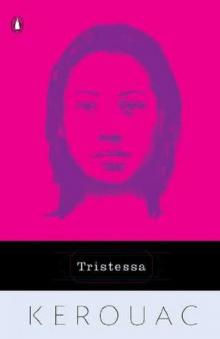 Tristessa
Tristessa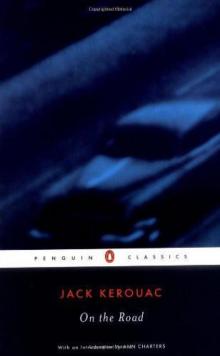 On the Road
On the Road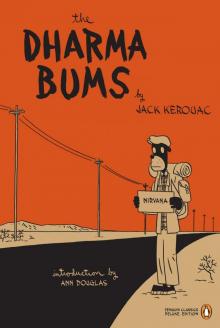 The Dharma Bums
The Dharma Bums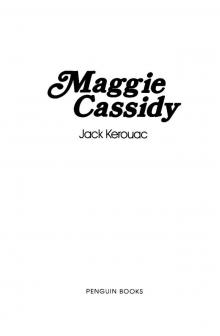 Maggie Cassidy
Maggie Cassidy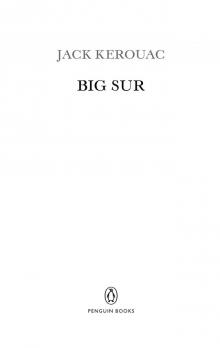 Big Sur
Big Sur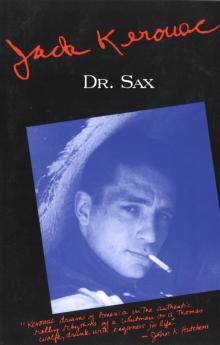 Dr. Sax
Dr. Sax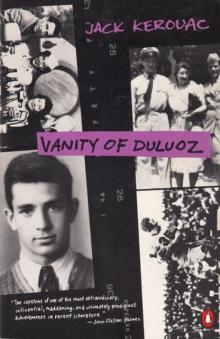 Vanity of Duluoz: An Adventurous Education, 1935-46
Vanity of Duluoz: An Adventurous Education, 1935-46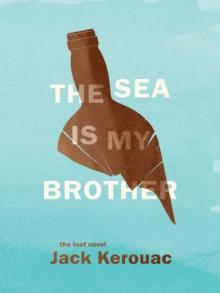 The Sea Is My Brother
The Sea Is My Brother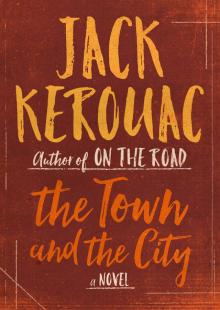 The Town and the City: A Novel
The Town and the City: A Novel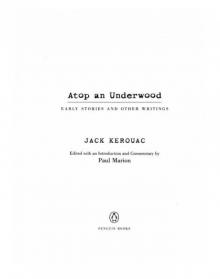 Atop an Underwood: Early Stories and Other Writings
Atop an Underwood: Early Stories and Other Writings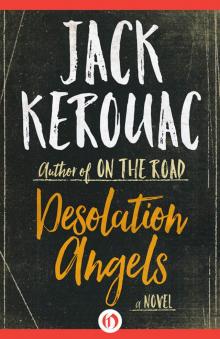 Desolation Angels: A Novel
Desolation Angels: A Novel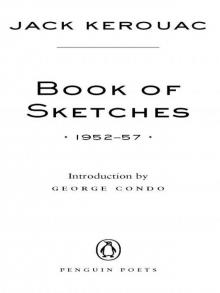 Book of Sketches
Book of Sketches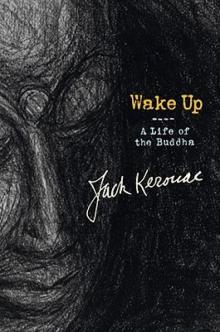 Wake Up: A Life of the Buddha
Wake Up: A Life of the Buddha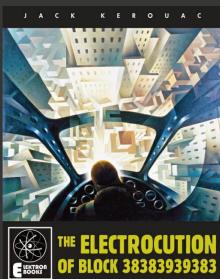 The Electrocution of Block 38383939383
The Electrocution of Block 38383939383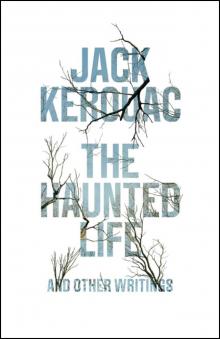 Haunted Life
Haunted Life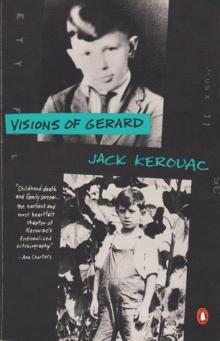 Visions of Gerard
Visions of Gerard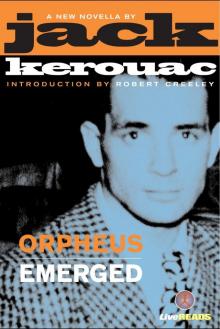 Orpheus Emerged
Orpheus Emerged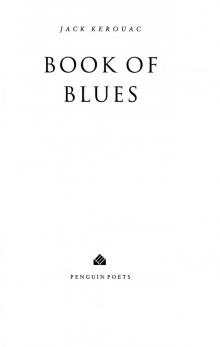 Book of Blues
Book of Blues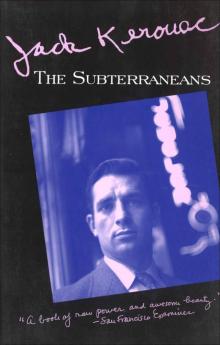 The Subterraneans
The Subterraneans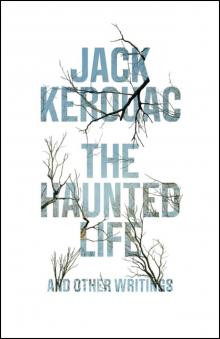 The Haunted Life
The Haunted Life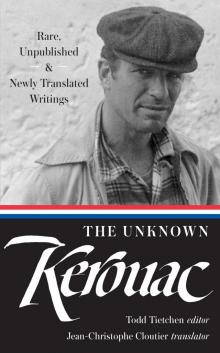 The Unknown Kerouac
The Unknown Kerouac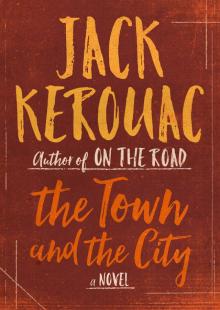 The Town and the City
The Town and the City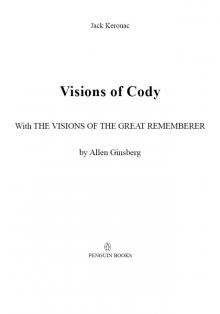 Visions of Cody
Visions of Cody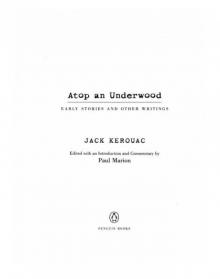 Atop an Underwood
Atop an Underwood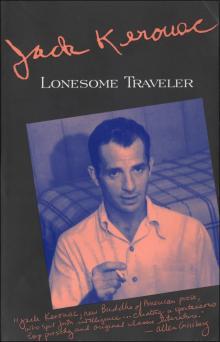 Lonesome Traveler
Lonesome Traveler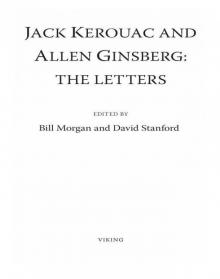 Jack Kerouac and Allen Ginsberg
Jack Kerouac and Allen Ginsberg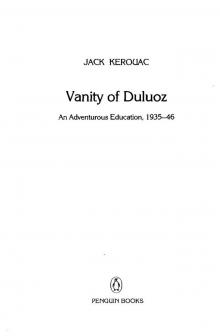 Vanity of Duluoz
Vanity of Duluoz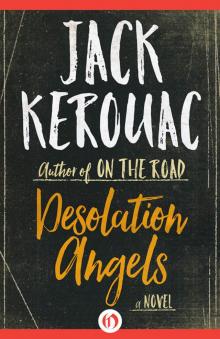 Desolation Angels
Desolation Angels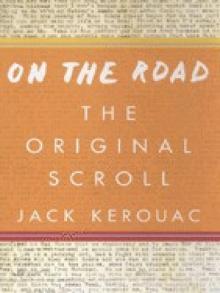 On the Road: The Original Scroll: (Penguin Classics Deluxe Edition)
On the Road: The Original Scroll: (Penguin Classics Deluxe Edition)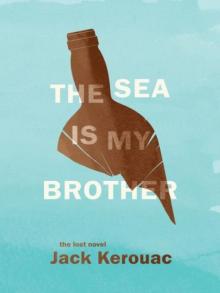 The Sea Is My Brother: The Lost Novel
The Sea Is My Brother: The Lost Novel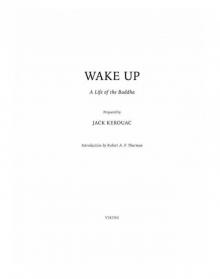 Wake Up
Wake Up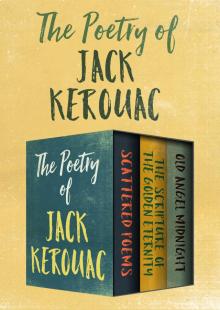 The Poetry of Jack Kerouac
The Poetry of Jack Kerouac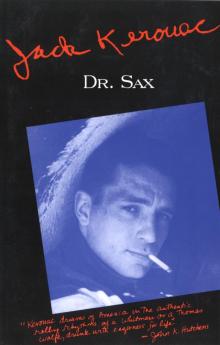 Doctor Sax
Doctor Sax